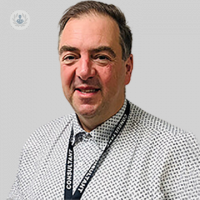Understanding echocardiography: a window to your heart
Written in association with:Echocardiography, often referred to as an echocardiogram or simply "echo," is a non-invasive diagnostic test that uses ultrasound waves to create detailed images of the heart. It plays a pivotal role in the assessment of cardiac health, allowing healthcare providers to visualise the heart's structure and function. Consultant cardiologist Dr Mark Scoote provides an in-depth explanation of the procedure.

What is echocardiography?
Echocardiography is a valuable medical imaging technique that employs ultrasound technology to produce real-time images of the heart. It is a safe and painless procedure that helps clinicians evaluate the heart's chambers, valves, and overall functionality. By providing clear visualisations of the heart in action, echocardiography allows healthcare professionals to diagnose various heart conditions, monitor treatment progress, and make informed decisions regarding patient care.
What are the different types of echocardiography?
There are several types of echocardiography, each tailored to specific diagnostic purposes:
Transthoracic Echocardiography (TTE): this is the most common form of echocardiography, involving the placement of an ultrasound probe on the patient's chest to capture images of the heart through the chest wall. TTE provides a comprehensive view of the heart and is widely used for initial assessments. It is a completely painless non invasive and safe ultrasound examination.
Transoesophageal echocardiography (TEE): TEE involves inserting a specialised probe into the patient's oesophagus to obtain more detailed images. It is particularly useful for assessing the posterior heart structures and is often used during surgeries or in cases where a more detailed image is required.
Doppler echocardiography: doppler echocardiography assesses the speed and direction of blood flow within the heart and blood vessels. It can identify issues such as valve regurgitation or stenosis and is frequently used alongside standard echocardiography.
Stress echocardiography: Here detailed pictures of the heart structure and function are obtained when the patient is exercising in real time or their heart rate is being sped up by medication. This allows hidden issues which may only be revealed when the heart is put under workload to be identified. This may be helpful in assessing the severity of any coronary artery blockages or the severity of certain heart valve problems that may seem less significant when the heart is at rest.
How do I prepare for an echocardiography?
Preparing for an echocardiogram is relatively straightforward. Patients are typically advised to wear comfortable clothing and avoid clothing with metal buttons or zippers. Since the procedure is non-invasive, there is usually no need for fasting or special dietary restrictions. Patients should inform their healthcare provider of any allergies or specific medical conditions that may affect the test.
What should I expect during the echocardiography procedure?
During the echocardiography procedure, the patient will be asked to lie down on an examination table and a special gel will be applied to the chest to improve the transducer's contact with the skin. The transducer, a small handheld device, will be moved across the chest to capture images of the heart from different angles. The entire process is painless and typically takes about 30 to 45 minutes. The ultrasound gel is completely water based and safe.
Patients may be asked to hold their breath at certain points to obtain clear images, and they should remain still during the examination. The sonographer, a trained technician specialising in echocardiography, will guide the transducer to capture the necessary images. Patients may hear the sound of their heartbeats during the procedure, which is entirely normal.
Are there any risks or side effects linked to the procedure?
Echocardiography is considered a safe and non-invasive procedure with minimal risks. Since it does not involve ionizing radiation or the use of contrast dyes, the procedure is well-tolerated by most patients.
Can echocardiography detect heart conditions in children?
Echocardiography is a valuable tool in paediatric cardiology, allowing healthcare providers to assess the hearts of infants, children, and adolescents. The procedure is adapted to suit the age and size of the patient, often using smaller transducers for children. It plays an important role in diagnosing congenital heart defects, monitoring heart function in young patients, and guiding treatment decisions in paediatric cardiology. There are specialist centres and trained sonographers to perform echocardiography on children.
If you would like to book a consultation with Dr Scoote, do not hesitate to do so by visiting his Top Doctors profile today.


